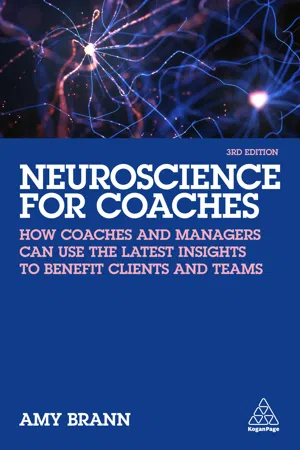
Neuroscience for Coaches
How coaches and managers can use the latest insights to benefit clients and teams
- English
- ePUB (mobile friendly)
- Available on iOS & Android
Neuroscience for Coaches
How coaches and managers can use the latest insights to benefit clients and teams
About this book
Many coaching tools and techniques are now well established, but how do they actually work? The third edition of Neuroscience for Coaches answers this question to help coaches and managers deliver greater value to clients and employees. Based on extensive research, Neuroscience for Coaches provides a clear explanation of the aspects of neuroscience that are relevant to coaching so coaches can describe to clients why particular techniques work and the benefits to be gained from using them. It also features interviews with Marshall Goldsmith, Susan Grandfield, Christian van Nieuwerburgh and Kim Morgan on topics including mindfulness and behaviour change in coaching.This fully updated third edition covers the latest neuroscientific research on key brain areas and their functions, such as the Prefrontal cortex and Amygdala which affect attention, processing and emotional regulation. With tips and insights throughout, it crucially demonstrates the ways in which coaches and managers who coach can use this information effectively and practically in their everyday work. Neuroscience for Coaches is a vital resource for improving coaching practice with the latest scientific developments, tools and techniques.
Frequently asked questions
- Essential is ideal for learners and professionals who enjoy exploring a wide range of subjects. Access the Essential Library with 800,000+ trusted titles and best-sellers across business, personal growth, and the humanities. Includes unlimited reading time and Standard Read Aloud voice.
- Complete: Perfect for advanced learners and researchers needing full, unrestricted access. Unlock 1.4M+ books across hundreds of subjects, including academic and specialized titles. The Complete Plan also includes advanced features like Premium Read Aloud and Research Assistant.
Please note we cannot support devices running on iOS 13 and Android 7 or earlier. Learn more about using the app.
Information
Table of contents
- Acknowledgements
- Prelude
- List of Abbreviations
- Introduction
- Part One Brain areas
- 01 Prefrontal cortex
- 02 Basal ganglia
- 03 Striatum and nucleus accumbens
- 04 Insular cortex
- 05 Amygdala
- 06 Anterior cingulate cortex
- 07 Hypothalamus
- 08 Hippocampus
- 09 Cerebellum
- Part Two Brain chemicals
- 10 Cortisol
- 11 Dopamine
- 12 Oxytocin
- 13 Serotonin
- 14 Noradrenaline
- 15 GABA and glutamate
- Part Three Foundational brain concepts
- 16 Neurons and synapses
- 17 Neuroplasticity
- 18 Threat/reward response
- 19 Neuroimaging
- 20 Working memory
- 21 HPA axis
- 22 Mirror neurons
- Part Four Brain networks
- 23 Brain networks
- Part Five The quantum brain
- 24 The quantum brain
- Part Six Neuroscience of classic coaching areas
- 25 Self-control/willpower
- 26 Optimism
- 27 Mindfulness
- 28 Expectations
- 29 Beliefs
- Skills
- 30 The Foundational Four: Safe space, listening, questioning, reflecting
- 31 Flow
- 32 Motivation
- 33 Decision making
- Tools
- 34 Goals
- 35 Habits
- Part Seven Neuroscience of not-so-classic coaching areas
- 36 Choice architecture
- 37 False memory
- 38 Trust
- 39 Fairness
- 40 Loneliness
- Conclusion
- Coaches in the know
- Calling all HR Professionals
- Glossary
- References
- Index